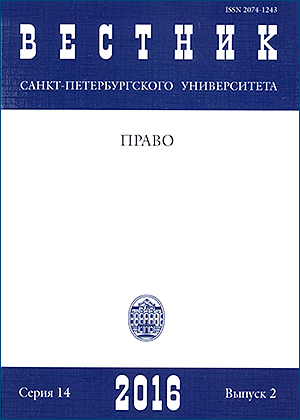The revival of the Silk Road: brief review of the 4th China-Eurasia Legal Forum
DOI:
https://doi.org/10.21638/11701/spbu14.2016.209Аннотация
The 4th China-Eurasia Legal Forum was held in Xi’an (China) by the China Law Society (Host) and the Northwest University of Political Science and Law (Organizer) between 17 and 19 October 2015. On the first day, October 18, the official business agenda proposed such scientific events as the first topic ‘Co-Construction of ‘Belt and Road’: the Role of Law’, second topic ‘The Legal Issues Related to Construction of Silk Road Trade Area’ and at last was the third topic ‘The Strategy of ‘Belt and Road’ and International Cooperation in Finance’. The second day of the Forum involved the topic ‘Legal issues on trade and investment facilitation of the Belt and Road’, questions about the legal security mechanism related to the economy of national interconnection and logistics of the Belt and Road (Topic 5), problems about legal issues on the national energy security and energy cooperation of the Belt and Road were concentrated into topic 6, the last was topic 7 proposed as key legal issues on the national security and anti-terrorist cooperation of the Belt and Road, and the last topic of the Forum’s second day concerned the legal issues of cultural heritage and tourism development of the Silk Road. In the present article the authors propose their brief review about the legal issues and legal problems covered by the main topics.
Ключевые слова:
the Silk Road, geopolitics, transportation, organization, social and economic potential, tourism, cross-border tourist route, the Shanghai cooperation organization, the prevention of extremism, terrorism and separatism
Скачивания
Библиографические ссылки
Загрузки
Опубликован
Как цитировать
Выпуск
Раздел
Лицензия
Статьи журнала «Вестник Санкт-Петербургского университета. Право» находятся в открытом доступе и распространяются в соответствии с условиями Лицензионного Договора с Санкт-Петербургским государственным университетом, который бесплатно предоставляет авторам неограниченное распространение и самостоятельное архивирование.






